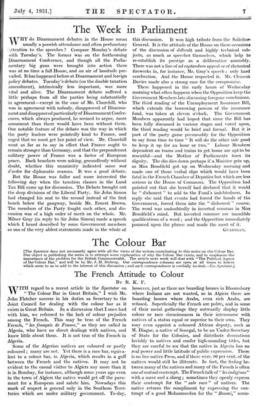The Week in Parliament
WHY do Disarmament debates in the House mean usually a poorish attendance and often perfunctory tttention to the speeches ? Compare Monday's debate with Tuesday's. The former was on the forthcoming Disarmament Conference, and though all the Parlia- mentary big guns - were brought into action there was at no time a full House; and an air of lassitude pre- vailed. It has happened before at Disarmament and foreign policy debates. Tuesday's debate (on the double taxation amendment), intrinsically less important, was more vital and alive. The Disarmament debate suffered a little perhaps from all the parties being substantially in agreement—except in the case of Mr. Churchill, who was in agreement with nobody, disapproved of Disarma- ment and disapproved particularly of Disarmament Confer- ences, which always produced, he seemed to argue, more armament than there would have been without them. One notable feature of the debate was the way in which the party leaders were pointedly kind to France, and urged that we must get her point of view. Mr. Churchill went as far as to say in effect that France ought to remain stronger than Germany, and that the preponderant military power of France was a factor of European peace. Back benchers were asking, groundlessly without doubt, whether this unanimity indicated some mot d'ordre for diplomatic reasons. It was a good debate.
But the House was fuller and more interested the following day when the taxation clauses in the Land Tax Bill came up for discussion. The Debate brought out the deep divisions of the Liberal Party. Sir John Simon had changed his seat to the second instead of the first bench below the gangway, beside Mr. Ernest Brown. The members of the Party fought each other, and dis- cussion was of a high order of merit on the whole. Mr. Milner Gray (in reply to Sir John Simon) made a speech which I heard described by some Government members as one of the very ablest statements made in the whole of this discussion. It won high tribute from the Solicitor'. General. It is the attitude of the House on these occasions of the discussion of difficult and highly technical sub- jects, as much as speeches themselves, which help to re-establish its prestige as a deliberative assembly. There was not a line of ad captandum appeal or of rhetorical fireworks in, for instance, Mr. Gray's speech ; only hard cerebration. And the House respected it. Mr. Clement Davies made also a strong case for the compromise.
There happened in the early hours of Wednesday morning what often happens when the Opposition keep the Government Members late discussing foregone conclusions. The third reading of the Unemployment Insurance Bill, which extends the borrowing powers of the insurance fund, was taken at eleven o'clock. The Government Members apparently had hoped that since the Bill has been fully discussed in various stages and voted upon, the third reading would be brief and formal. But it is part of the party game presumably for the Opposition to say from time to time "It will do the other side good. to keep it up for an hour or two." Labour Members dependent on trams and trains to get home are apt to be resentful—and the Mother of Parliaments loses its dignity. The din dies down perhaps if a Minister gets up, as Miss Bondfield got up on Wednesday morning and made one of those verbal slips which would have been fatal in the French Chamber of Deputies but which are less serious in the House of Commons. The Opposition had pointed out that she herself had declared that it would be " dishonest " to add to the Fund's indebtedness. In reply she said that events had forced the hands of the Government, forced them into the " dishonest " course. The word was undoubtedly in inverted commas in Miss Bond.field's mind. But inverted commas are inaudible qualifications of a word ; and the Opposition immediately pounced upon the phrase and made the most of it.
GUARDIAN.










































 Previous page
Previous page